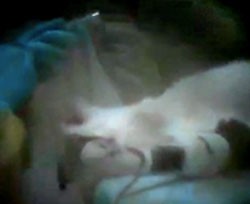Last month, People for the Ethical Treatment of Animals released an "undercover video" inside one of Washington University's labs, which the group says reveals the school's mistreatment of live cats in one of its courses. Soon after, PETA made more of a splash with an announcement that The Price Is Right's Bob Barker supported the cause and would even donate tens of thousands to rescue the cats from these labs.
But Wash. U. has continued to defend the practice, saying it is not cruel and is an important training tool, prompting PETA to try a different approach: a complaint with the Missouri attorney general's office.
"The course is indefensible," Justin Goodman, director of laboratory investigations with PETA, tells Daily RFT. "This is an opportunity for the attorney general to evaluate these misleading claims."
The complaint, outlined in a letter PETA sent to Attorney General Chris Koster yesterday, on view below, alleges that St. Louis Children's Hospital, Wash. U.'s partner, has violated Missouri's "false advertising" laws in its materials promoting the course in question.
PETA's "undercover video."
As we've reported, the schools's Pediatric Advanced Life Support, or PALS, course involves intubating anesthetized cats as a way to learn about infant treatment. PETA says that this is cruel to the cats, which are put at risk and could wake up during the course -- and further argues that no other institution across the country uses live cats for this procedure anymore. That's because, PETA says, it is proven to be less effective than using "simulation mannequins," which do not involve live cats.
Wash. U., however, argues that it is a superior training method since it gives students the opportunity to practice on cats that have "upper airway anatomy and reflexes that closely resemble an infant's." Further, the school says that it is completely safe, that no cats have ever been harmed, that they are closely monitored, used infrequently -- and all eventually adopted.
Since it seems the school will be sticking to that defense, PETA is trying to up the ante by involving the attorney general; targeting misinformation through advertising seemed like a logical approach, Goodman says.
"We believe that they are misleading the public and potential course participants who are going to pay money to take a course that the university and the hospital is claiming is superior to others with absolutely no evidence to support that," Goodman says.
Continue for more from PETA and the full complaint.






